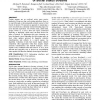106
click to vote
UIST
2010
ACM
15 years 6 days ago
2010
ACM
Twitter streams are on overload: active users receive hundreds of items per day, and existing interfaces force us to march through a chronologically-ordered morass to find tweets ...
129
click to vote
IOT
2010
15 years 8 days ago
2010
The increasing penetration of the real world with embedded and globally networked sensors leads to the formation of the Internet of Things, offering global online access to the cur...
157
Voted
EMNLP
2010
15 years 10 days ago
2010
Recurrent event queries (REQ) constitute a special class of search queries occurring at regular, predictable time intervals. The freshness of documents ranked for such queries is ...
103
click to vote
AIRS
2010
Springer
15 years 11 days ago
2010
Springer
The dominant method for evaluating search engines is the Cranfield paradigm, but the existing metrics do not consider some modern search engines features, such as document snippets...
133
Voted
ACMSE
2010
ACM
15 years 11 days ago
2010
ACM
Most present day search engines have a deterministic behavior in the sense that they return the same search results for all users who submit the same query at a certain time. They...
127
Voted
ACL
2010
15 years 11 days ago
2010
Is it possible to use sense inventories to improve Web search results diversity for one word queries? To answer this question, we focus on two broad-coverage lexical resources of ...
144
click to vote
PVLDB
2010
15 years 22 days ago
2010
Users of text search engines are increasingly wary that their activities may disclose confidential information about their business or personal profiles. It would be desirable f...
121
click to vote
SIGIR
2008
ACM
15 years 24 days ago
2008
ACM
Blog/news search engines are very important channels to reach information about the real-time happenings. In this paper, we study the popular queries collected over one year perio...
125
Voted
CIKM
2010
Springer
15 years 28 days ago
2010
Springer
One of the main problems in online advertising is to display ads which are relevant and appropriate w.r.t. what the user is looking for. Often search engines fail to reach this go...
141
click to vote
CIKM
2010
Springer
15 years 28 days ago
2010
Springer
Ranking Web search results has long evolved beyond simple bag-of-words retrieval models. Modern search engines routinely employ machine learning ranking that relies on exogenous r...




